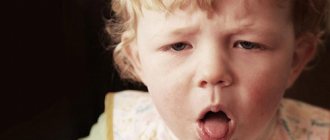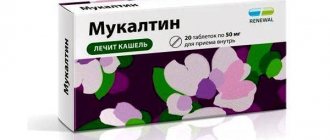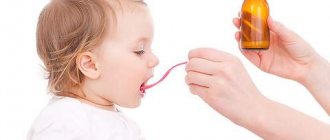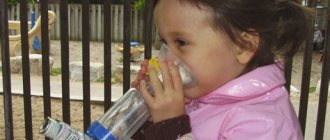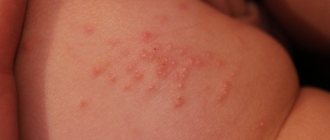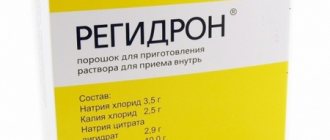Coughing is a natural reflex through which the body clears the respiratory system of irritants, such as dust, dirt or mucus in diseases of the nasopharynx. Coughing attacks at night in a child can occur due to pathologies of the lungs, bronchi, stomach, allergic or mental reactions. To eliminate the problem, you need to find out the cause of the condition using characteristic symptoms. Let's consider what the symptom is associated with, how to help the patient with medications or folk remedies, and in what cases a mandatory visit to the pediatrician is required.
What childhood diseases can be accompanied by coughing attacks?
There are 7 common diseases in which this symptom is observed.
Allergic reaction
A common cause of night cough is considered to be hypersensitivity to bedding - down pillows, wool. The baby inhales small particles of these materials, they penetrate into the lungs, and in response to this, a protective mechanism is activated - the cough reflex is activated.
It is easy to suspect such a condition. If there are no symptoms during the day and coughing appears only after going to bed, then the symptom is most likely of allergic origin.
Bacterial and viral infections
A cold may be the cause of a paroxysmal cough. These processes are accompanied by increased production of sputum in the lungs. During the day it accumulates in the bronchial tree. When the baby assumes a horizontal position, mucus moves up the respiratory tract and irritates the receptors. Against this background, severe night cough and runny nose occur.
ARVI is one of the causes of cough in children
Laryngitis
Inflammatory damage to the larynx leads to the child developing a strong dry cough, the so-called “barking”. The symptom is usually worse in the evening and at night. Other manifestations of laryngitis include sore throat, nasal congestion and hoarseness, up to complete loss of voice.
Bronchial asthma
In severe cases of the disease, nocturnal attacks occur. In addition to a strong suffocating cough, they are accompanied by periods of feeling a complete lack of air. The child begins to choke, breathe shallowly and quickly, and respiratory arrest develops. The condition requires emergency treatment (for example, administration of Pulmicort).
Whooping cough
This is a rare infection, since universal vaccination against the disease is carried out in Russia. However, if the baby has not been vaccinated, it is worth suspecting its presence. The main symptom of whooping cough is a paroxysm of painful dry cough, which intensifies at night.
Reflux of gastric contents
In the absence of symptoms of infection (fever, weakness, headache), gastroesophageal reflux disease should be suspected. This pathology occurs when the contents of the stomach are thrown into the esophagus. Gastric juice has an acidic environment, which aggressively affects the mucous membrane of the organ. The reflux of secretions leads to heartburn, sore throat and severe cough.
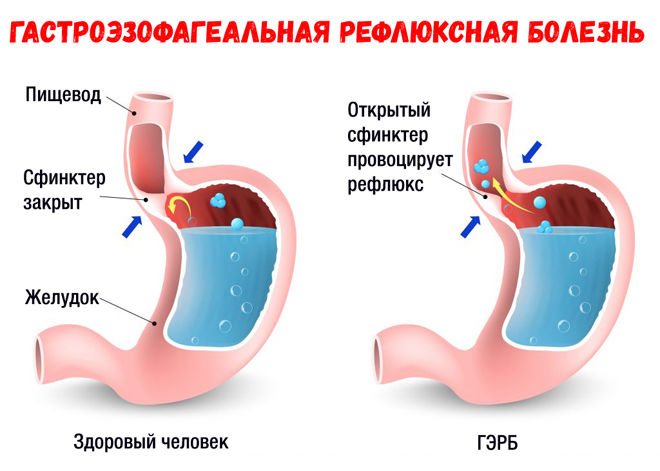
Tuberculosis
If your baby has been in contact with an infected patient and develops symptoms of the disease, you should immediately consult a doctor.
Causes of night cough
The causes of this problem in newborns can be very diverse. The most common natural causes include:
- Development of the respiratory organs. Coughing should not be a cause of concern if it occurs no more than 15 times a day.
- Adaptation of the child’s body to natural bronchial secretions.
- Accumulation of saliva and breast milk in the mouth when the baby's head is in a horizontal position.
- Teething. During this period, the newborn actively begins to secrete saliva, which is difficult for him to swallow, especially if he lies on his back for a long time, so he begins to cough.
- The presence in the air of the surrounding space of particles that irritate the delicate mucous membranes (for example, cigarette smoke, dust, chemicals).
If a baby begins to cough while sleeping, parents should monitor its general condition very closely. If it is accompanied by other symptoms or becomes prolonged, this may indicate that the baby is sick.
Less harmless reasons include the following:
- Allergy. This reason is quite common. An allergic reaction in a baby can occur to the fluff and feathers that fill pillows, wool, and household chemicals that are used to wash children's clothes. The main sign of an allergy to washing powder may be the fact that the child begins to cough only when going to bed. If the cause of this is an allergy, it is necessary to eliminate the allergen and then the baby’s cough will stop.
- Runny nose. Even a slight runny nose can trigger a cough, since the newborn spends most of the time lying on his back, as a result of which secretions enter the throat, thereby provoking a cough.
- Development of the disease. Not all diseases begin abruptly, with a rise in temperature and the appearance of other alarming symptoms. Thus, rhinitis, pharyngitis and sinusitis begin almost imperceptibly, their symptoms are only cough and runny nose.
In these cases, in order to rid the baby of an unpleasant symptom, it is necessary to eliminate its cause by removing allergens from the child’s environment and curing associated diseases.
Why does my child cough at night?
The appearance of the symptom is explained by the physiological characteristics of the body. When sleep occurs, the regulatory activity of the nervous system decreases slightly. This leads to an increase in the severity of clinical manifestations.
At night, the child lies almost motionless, which leads to the accumulation of sputum. To prevent blockage of the bronchial tree with viscous secretions, the body triggers a protective cough reflex, which helps clear the airways. Therefore, if a symptom is present, it is not always worth using antitussives. It is much more effective to use mucolytic drugs, which dilute mucus and promote its rapid removal from the bronchi.
Types of cough
There are two main types of symptoms in children. Dry implies the absence of phlegm; it occurs due to irritation of the bronchi and a reflex reaction of the body. Another reason is the release of viscous sputum, which covers the walls of the bronchi and does not come out during coughing.
Dry cough is typical for the following diseases:
- flu;
- initial stages of development of ARVI;
- pharyngitis;
- laryngitis;
- early stage of bronchitis.
A wet cough is characterized by active sputum production. Coughing is considered a more favorable prognostic sign for the patient, since during the discharge of mucus the bronchial tree is cleared and the child recovers. Therefore, usually the wet type of symptom is found in the later stages of pneumonia or bronchitis.
Dry cough: what to do for treatment?
The main method of therapy is the prescription of mucolytic agents. The most effective drugs from this group are Ambrobene, Bromhexine and Herbion. They thin mucus and help remove it from the lungs. Medicines transform a dry cough into a wet one, which is much easier to treat. Removing mucus from the bronchi helps cleanse the airways and restore normal condition.
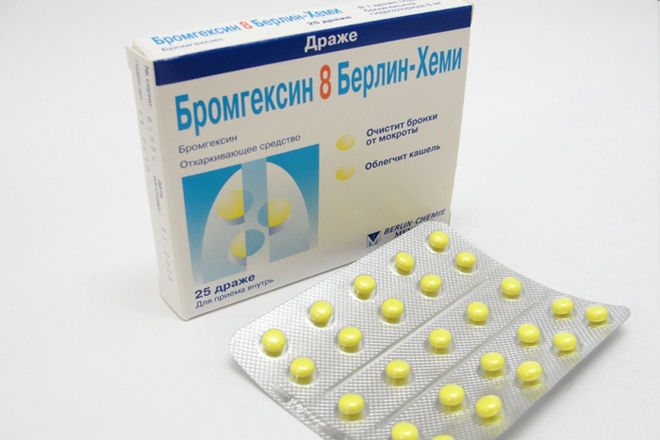
First aid for wet cough
In this case, expectorant drugs are prescribed. These medications accelerate the removal of mucus from the bronchi. Dr. Komarovsky recommends using the following products:
- Mucaltin is a derivative of medicinal marshmallow;
- Bronchicum and Pertussin are thyme-based forms;
- Bronchophyte is a preparation made from wild rosemary;
- Herbion is a syrup containing plantain.
Medicines for children are of plant origin, so they rarely cause side effects.
How to relieve an allergic cough
Hypersensitivity reactions are dangerous conditions that require emergency treatment. They can manifest as swelling of the larynx, which will cause an attack of suffocation that is dangerous to health, so it is important to start therapy in a timely manner. If the symptom is of allergic origin, the patient is prescribed treatment aimed at relieving the cause of the disease. It is necessary to establish the specific allergen to which the reaction developed. After this, treatment with special drugs is prescribed - antihistamines (Suprastin or Tavegil). Their use inhibits the development of allergies and eliminates severe clinical manifestations.
Methods for getting rid of night cough
Before you begin to get rid of the problem, you need to determine what disease the coughing child has caught.
It is better not to draw independent conclusions and seek help from a specialist who will make a diagnosis and prescribe appropriate treatment.
Suppressing a night cough threatens to weaken protective functions and, as a result, worsen the disease.
Mucus and phlegm, which do not leave the body, but accumulate and enter the lungs, provoke the development of pneumonia.
Only a specialist will be able to determine why the child is coughing and recommend the correct medication treatment.
If it turns out that the causes of the cough are not viruses or allergies, then you can try to cope on your own.
- Prepare an evening bath with the addition of infusions of calendula, St. John's wort and string. These herbs will help ease breathing and reduce the manifestation of an allergic cough until the reasons for such a reaction in the body are clarified.
- Humidification will help with dry air. You can achieve humidification by installing a humidifier or an aquarium in the children's room. It is also recommended to ventilate it for at least half an hour before going to bed. As a last resort, you can carry out wet cleaning more often (several times a day) or hang wet things on radiators.
- Place saucers with infusion of thyme or sage on the baby's bedside table near the crib overnight. This approach will help humidify the air and relieve coughing at night and in the morning.
- Arrange periodic “swims” in a hot bath. The warm steam emanating from it is useful in treating night coughs. After inhaling it, it will become easier for the child to cough up, and phlegm and mucus will gradually stop tormenting the baby.
- During sleep, periodically change the position of the child in the crib. This way you can avoid a large accumulation of mucus in the lungs and help your baby cope with attacks.
- Try to clear the children's room of things on which allergens may accumulate. As a last resort, move them away from the crib to reduce the likelihood of nighttime coughing.
For what symptoms should you call an ambulance?
Signs of anxiety that should promptly take your child to the doctor include:
- Attack of suffocation.
- Swelling of the larynx.
- Severe rash over the entire surface of the skin.
- A sharp increase in temperature.
- Severe headache.
- Incessant vomiting and constant nausea.
The listed symptoms indicate serious violations of vital organs, so if they appear, you need to call an ambulance. At night, parents should monitor the child's condition. The presence of episodes of suffocation is a reason to hospitalize the baby, since it is not always possible to quickly respond to an attack without the intervention of a doctor.

How to help at home
Self-treatment is only permissible for mild coughs. In more severe cases of pathology, you should definitely consult a doctor. Self-medication is dangerous because home methods usually only eliminate the symptoms of the disease. They blur the picture of the infection, the parents think that the child has gotten better. In fact, the pathology continues to progress. Prolonged course without specific therapy can lead to serious consequences.
A child with a night cough should definitely be seen by a doctor. After examination and diagnosis, the specialist prescribes specialized treatment. You can use additional folk remedies, but only together with therapy, and not instead of it.
Sufficient indoor humidity
Coughing may occur due to dry air in the bedroom. The bronchial tree is irritated by dust particles that enter the respiratory tract, which leads to the appearance of a symptom. Therefore, before going to bed, it is recommended to ventilate the room and do a little wet cleaning. At the moment of ventilation, you need to take the baby to another room so that he does not get blown out. You can use special air humidifiers that quickly saturate the bedroom with moisture.
Bathing
Immediately before bedtime, it is necessary to carry out water procedures. They have a beneficial effect on the body. The layer of dust and dirt that inevitably accumulates during the day is removed from the skin. Bathing also has a positive psychological effect. After water procedures, the child calms down, which reduces the likelihood of neurogenic coughing. To achieve this effect, you can add a few drops of essential oils to the water, which have a calming effect on the baby.

Inhalations
Inhalation of saline solutions moisturizes the mucous membrane of the bronchial tree, reducing the severity of dry cough. The procedure directly affects the respiratory tract, promoting the removal of mucus. Regular use of the technique calms the child, so he falls asleep faster.
Parents should understand that inhalations should be done for bronchitis, pneumonia or colds. For other pathologies they are ineffective. It is prohibited to carry out procedures for laryngitis and allergic reactions. A contraindication to inhalation is severe fever.
Folk remedies
Home treatment methods include:
- Warm milk with honey. The solution warms the throat and stimulates local blood circulation.
- Drink plenty of water (compotes, tea with raspberries, fruit drinks). The intake of fluid into the body reduces the severity of intoxication.
- Potato compresses applied to the chest. The product has a mild effect on the condition of the respiratory tract.
- Rubbing. The procedure warms up the skin and accelerates blood circulation in the lung area.

Pharmacy drugs
To treat coughing, medications are used that have an expectorant and mucolytic effect. You can buy lozenges or baby syrups at the pharmacy without a doctor's prescription. The most effective drugs are Mucaltin, Ambrobene, Travisil. Regular use of these drugs stops the progression of the symptom and helps cleanse the bronchial tree by liquefying sputum and releasing it through coughing.
TOP - 12 folk remedies when a child has a night cough
The main treatment, of course, is the use of medications, because this is the only way to completely get rid of the cough.
But to alleviate this painful symptom at night, it is necessary to turn to traditional medicine, which always has several effective remedies in its arsenal.

But do not forget that even the use of alternative medicine requires consultation with a doctor. Especially if your child is still very young.
The following remedies will help you fight a cough:
- Warm milk with soda added (half a teaspoon). This remedy will help cope with dry cough. Along with it, a well-known remedy is actively used - milk with honey, which has the same effect.
- Tea with raspberry jam. To enhance the effect of the active substances of raspberries, you should prepare herbal tea (preferably some kind of mixture with an expectorant effect). In this case, simple black or green tea will be of little use. With such success, you can prepare a regular raspberry compote (by stirring a spoonful of jam in boiled warm water).
- Burnt sugar , or, as it is also called, “burnt sugar”. Pour a tablespoon of sugar into a special bowl, which is placed over medium heat. We wait until the sugar turns into amber caramel, after which we add this syrup to a glass of hot milk and stir thoroughly. It is necessary to allow the drink to cool, because drinking hot liquid can burn the already inflamed mucous membranes of the throat.
Add a few drops of aloe to the resulting mixture. After this, you can begin treatment by drinking homemade syrup three times a day.
- Banana syrup. To prepare, you will need one finely grated banana, which must be mixed with one tablespoon of liquid honey. Heat the resulting mixture on the stove until it darkens (this may take about 10 minutes). We distribute the syrup into several doses, which need to be carried out over the course of one day.
- Ginger tea with lemon and honey. You will need one tablespoon of finely grated ginger, which is placed in a cup in advance. We also put a tea bag there, for example, green tea, because it is so beneficial for a weakened body. Pour boiling water over and leave for a while to brew completely. Add a little honey or your favorite jam to the warm drink. A slice of lemon will complement this healthy drink. It is advisable to take this remedy every two hours.
- Onions with sugar and honey. You need to immediately prepare a glass of chopped onion (preferably grate it on a fine grater), and mix it with the same glass of sugar. Boil the mixture for five minutes. Add 2 tablespoons of liquid honey to the cooled onion mass. Give your baby a teaspoon every hour.
- Honey with mustard. To prepare, you will need half a standard stick of butter, 5 teaspoons of honey and just one teaspoon of dry mustard. Mix all ingredients thoroughly, then give your child one teaspoon of this product before meals.
- Black radish with honey. We choose a medium-sized root vegetable from which we will have to cut off the “cap”. After this, you should cut out the core of the vegetable using a special sharp spoon. Place a certain amount of honey into the resulting cavity and let the product brew. After a few hours, the vegetable will release its healthy juice, which will mix with honey. Take one teaspoon every two hours.
- Ground viburnum helps speed up the discharge of sputum. Fresh viburnum berries must be ground through a sieve and then mixed with honey. You can choose the proportions yourself, but it is advisable that the berry mass exceeds the amount of honey several times. The child should be given a tablespoon up to four times a day.
- Compress based on mashed potatoes. Place a certain amount of the prepared puree on a separate plate and let it cool slightly. We distribute the warm potato mass over the surface of the child's back and cover it with cling film, and wrap it with a warm scarf on top. The procedure will last until the mixture has completely cooled.
- Pine buds boiled in milk. Boil half a liter of milk with the addition of a tablespoon of kidneys, boil for about five minutes, and immediately remove from heat. Leave the product for an hour so that it infuses properly. Give the child 50 g every two hours.
- Herbal collection with expectorant effect. Soothes coughs and also relieves irritation of the mucous membranes of the respiratory tract. This product can be purchased at any pharmacy, and its price will not be high.
What to do when you cough for no apparent reason?
In some cases, the occurrence of coughing is not associated with infectious diseases - colds or flu. The appearance of a symptom for no apparent reason confuses parents and forces them to use cough medications uncontrollably. This cannot be done, since symptomatic treatment does not affect the factor that caused the clinical manifestations.
If coughing occurs that is not associated with obvious reasons, it is necessary to take the child to the pediatrician. The doctor will ask the parents in detail about their complaints, conduct an examination and prescribe an examination. Based on the test results, it will be possible to determine why the pathological cough appeared. This will allow you to begin specialized treatment and eliminate the unpleasant symptom.
Eliminate the possibility of allergies
The appearance of a symptom for no apparent reason is caused by a hypersensitivity reaction to a substance. This is especially true for bedding, for example, coughing often occurs due to down pillows.
Expert opinion
Prosekova Diana Igorevna
Allergist-immunologist. Doctor of the highest category. Doctor of Medical Sciences.
If a child's condition worsens immediately after he goes to bed, an allergy should be suspected and special tests should be done. If the diagnosis is confirmed, completely eliminate the harmful substance from the baby’s environment and carry out special therapy.
If a foreign body is inhaled
In case of a severe attack, it is necessary to inspect the throat for a foreign object getting into it. Small toys can get stuck there, leading to breathing problems. Parents should try to remove it themselves using tweezers. If you cannot quickly relieve attacks of dry cough in a child at night, you need to urgently call an ambulance. If there is a risk of damaging the throat tissue with a foreign body, you should not carry out the procedure yourself - it is better to trust a healthcare professional.
Arose without any reason
If the baby can cough without external reasons, you need to contact your local pediatrician and describe the condition. Were there any stress factors, did symptoms arise from other systems - for example, signs of digestive disorders. The doctor will prescribe an examination that will determine the cause of the symptom. Additional consultations with other doctors may be required for an accurate diagnosis.
Help with coughs that are caused by specific reasons
Pediatricians and pediatric pulmonologists who examined the baby and established the cause of the painful condition of the respiratory system know how to relieve a child’s cough at night. Below are medications that are recommended to be taken to relieve cough if you have a specific disease.
Colds and flu
If you have a cough of a cold etiology, or caused by the influenza virus, it is necessary to use local remedies to rub the chest and lower part of the neck. Doctor Mom ointment is best suited.
The drug should be applied in an even layer over the entire surface of the skin, and then slowly rubbed into the epithelial layer for 10-15 minutes. The therapeutic procedure is performed in the morning, when the child has just woken up, and also before going to bed.
Bronchitis
If you have a cough caused by bronchitis, it is necessary to use means that dilute the mucus and remove it from the respiratory system, namely:
- Ambrobene - take 1 capsule 2-3 times a day for 7-10 days;
- Mucaltin is a drug with a mucolytic spectrum of action, taken 1 tablet 3-4 times a day or immediately at the time of a coughing attack (the medication must be slowly dissolved in the mouth);
- ACC - taken 200-400 mg per day, dividing the dosage into 2 times.
It is very important that during the examination the nature of the origin of bronchitis is established. If it is caused by a bacterial infection, then in addition to stopping the cough, the use of antibacterial drugs will be required.
Pneumonia
This disease is characterized by acute inflammation of bronchopulmonary tissues.
To relieve attacks of night cough, use the following remedies:
- Herbion primrose syrup - take 1 tsp. 3 times a day, and also during an attack of bronchial spasm;
- Fluditec is a syrup that relieves acute inflammation and expands the bronchial lumen (prescribed to children over 2 months old with a dosage of 1 tsp 2 times a day);
- Prospan - taken 10-15 drops 3 to 5 times a day (can also be used as a medicinal solution for inhalation with a nebulizer).
In addition to the above drugs, which can quickly relieve a child’s night cough, it is necessary to use potent anti-inflammatory and antibacterial medications. They are prescribed by a pediatrician or pulmonologist based on the results of the child’s examination.
Adenoids
Children suffering from adenoids may experience the problem of a dry cough that occurs at night. Its appearance is due to the fact that the child cannot breathe through his nose, and air enters the lungs exclusively through the oral cavity. In this regard, the mucous membrane of the respiratory tract dries out, the child feels a tickle and begins to cough.
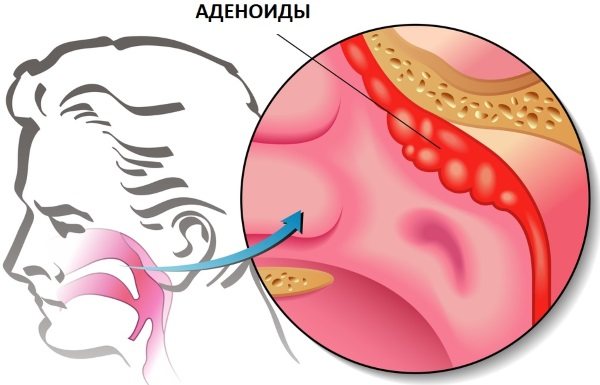
If there is such a problem, you need to give your baby warm milk or water to drink. Surgery to remove the adenoids should be performed in the near future. Otherwise, the child will constantly experience attacks of night cough.
Allergy
An acute allergic reaction to food, dust, chemical vapors, or other external irritants can result in bronchial spasm.
To relieve an allergic cough that bothers a child at night, it is recommended to use the following medications:
- Aleron - take 1 tablet per day (at the same time for 8-12 days);
- Suprastin - take 0.5 tablets 2-3 times a day, depending on the severity of the allergic reaction (the duration of therapy is determined by an allergist or pediatrician);
- Ketotifen - you need to take 1 tablet 2 times a day in the morning and evening directly while eating (the duration of treatment is at least 2-3 months).
These drugs eliminate allergic coughs and block the negative effects of allergens concentrated in the child’s blood. To maintain a sustainable therapeutic effect, it is necessary to establish the cause of the spasm and eliminate the source of the allergic reaction. Otherwise, attacks of night cough can develop into a chronic form of bronchial asthma.
Whooping cough
In case of damage to the respiratory tract by the causative agent of whooping cough, it is recommended to take the following medications to relieve severe night cough:
- Erythromycin is an antibiotic, the active components of which suppress the growth of bacterial pathogens, relieve the inflammatory process and accelerate recovery (children take the drug every 6 hours, 30-50 mg for 10-14 days);
- Amoxiclav is a broad-spectrum antibacterial agent, which is taken 125 mg 3 times a day for 7-10 days;
- Flemoklav - you need to take 1 tablet 2-3 times a day (the duration of therapy is determined by the attending physician).
Whooping cough is a dangerous infectious disease that can cause not only attacks of severe night cough, but also a host of other complications that pose a serious danger to the life and health of the child.
Tracheitis
In most cases, tracheitis is caused by pathogenic microorganisms that parasitize on the surface of the tracheal mucosa. Due to this, it becomes inflamed and the child experiences a constant feeling of irritation; there is a dry barking cough that gets worse at night.
To make the baby feel better, the following sulfonamide drugs are used:
- Streptocide - give 1 tablet as soon as a coughing attack begins (the drug is absorbed in the mouth);
- Septefril - you need to take 0.5 tablets of the drug, give it to the child, so that he puts it under the tongue, and swallows the saliva, which contains medicinal substances;
- Inhalation with a physical solution - for this you will need to take a nebulizer, fill it with 3-5 ml of a physical solution and inhale warm vapors, warming up the inflamed trachea and relieving spasm.
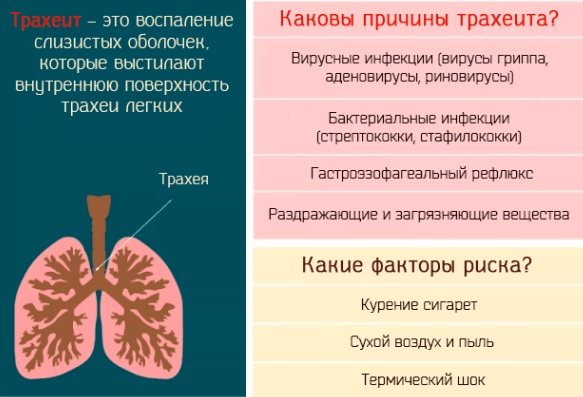
To completely get rid of a cough caused by tracheitis, a child may need to undergo a course of injectable antibiotics, the selection of which is carried out by a pediatrician based on which microorganism caused the inflammation of the trachea.
Laryngitis
Parents should know how to relieve a child's cough at night caused by laryngitis. This disease most often develops in children with tonsils removed.
To achieve a quick effect and relieve spasm, it is recommended to use the following methods:
- lubricate the child’s larynx with Lugol’s solution;
- put a warming compress on the neck with a water-alcohol base;
- rub the surface of the chest and the front wall of the neck with Doctor Mom or Zvezdochka ointment, and then wrap the child in a warm blanket to achieve a warming effect.
Night cough, which is caused by laryngitis, lasts on average no more than 3-5 days. If the spasm of the respiratory tract lasts longer, this may indicate the development of complications and the addition of a bacterial infection.
Parasitic diseases
One of the symptoms of severe helminthiasis in children is an attack of severe dry cough, which bothers the baby at night. This is due to the biological rhythms of parasite activity, which can penetrate bronchopulmonary tissue and cause spasm.
In this case, the following drugs are used:
- Pyrantel;
- Vermox;
- Dekaris;
- Praziquantel.
They are taken 1 tablet every 2-3 weeks. After this, it is necessary to re-examine the child with a doctor and repeat the medication to consolidate the therapeutic effect. More severe cases may require a long course of treatment in the parasitology department.
Teething
During teething in children, the mucous membrane of the mouth and larynx may become inflamed. It is possible that the receptors in the upper respiratory tract are irritated, which leads to a sore throat and bouts of dry cough. In this case, it is recommended to give your child chamomile tea. A folk remedy is prepared by brewing 0.5 tsp. dried chamomile in 250 ml of boiling water.
In order to relieve a child’s cough that occurs at night as quickly as possible, it is necessary to know the basic causes of its occurrence.
If there is already a diagnosis, medications and folk remedies with a targeted spectrum of action are used. In addition to relieving attacks of bronchial spasm, the child should receive complex therapy to completely get rid of the signs of night cough. This will also minimize the risk of relapse of the disease.
